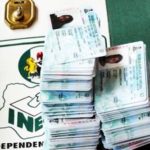The leadership of INEC has perfected plans to allow people with disabilities exercising their voting rights.
The Independent National Electoral Commission (INEC) has disclosed that the commission has perfected arrangements for the deployment of ballot papers printed in Braille to ensure that visually impaired persons vote unaided in the 2019 general elections.
Chairman of the Commission, Prof. Mahmood Yakubu, made the disclosure, on Thursday, during a sensitisation outreach at the University of Abuja Campus on the ongoing civic registration exercise.
The Commission’s boss further noted that the exercise is part of the commission’s effort to make the democratisation exercise all inclusive for the People Living with Disabilities in the country.
He noted that the commission had during the Anambra governorship election started with the provision of magnifying glasses for the albinos, promising that wheel chairs will also be provided for the cripples.
“For the visually impaired, we can provided ballot papers printed in Braille. For the albinos, we have started the use of magnifying glasses in Anambra, and the other phisically challenged people, we will be deploying wheelchairs,” Yakubu said.
The INEC boss assured the university community that registration centres have been opened on the campus and urged them to avail themselves of the opportunity to participate in the exercise.
Confirming that those who registered in 2017 have begun to collect their cards in the first quarter of 2018 ahead of the 2019 general elections, he disclosed that the four million registered in 2017 and another two million registered in 2018, will all collect their PVCs, promising that the 11 million Nigerians that will be registered before 2019 will all collect their pvcs.
“We have opened registration centre at the campus and I want you urge the university community to utilize the opportunity provided to them. Let me reassure that those who registered in 2017 have started collecting their cards in the first quarter of 2018 ahead of the 2019 general elections.
“The four million registered in 2017 and another two million registered in 2018, will all collect their PVCs. The 11 million Nigerians that will be registered before 2019 will all collect their PVCs,” he said.
While fielding questions from the students the INEC chairman told one of the students who claimed he first voted at the age of 12 that the voting age from 18 years and anything less than 18 will be unlawful.
He also told the university community that for now the law only made provision for transfer if one intends to vote elsewhere other than the originally registered, adding that what the person required is to apply to the INEC office in the local government of his new residence.
Celebrities that graced the event which included musicians Tuface Innocent Idibia, Helen Paul and Cobhams Asuquo urged the students to avail themselves of the CVR exercise and ensure that they participate in the 2019 by casting their votes.
A visually impaired and Music Producer, Mr Cobham’s Asuquo had earlier urged INEC to assist people living with disabilities to exercise their franchise in accordance with the secret ballot principle so that he would vote unaided, urging INEC; “to stop underaged voting stressing that the phenomenon is a reality.”
Head of European Union delegation to Nigeria, Mr Ketil Karlson noted that 60 per cent of influence in the Democratic process is determined by the young people but noted that there is a lull in youth participation across the world.
“I appeal for greater participation considering the greater percentage of the youths, both in elective offices and in the election processes in general. I wonder why fewer youth participate. Biggest pockets don’t necessarily win elections but biggest ideas.”
According to Kalson, the EU is in Africa to promote democracy and strengthen democratic institutions.
Source: News Agencies



